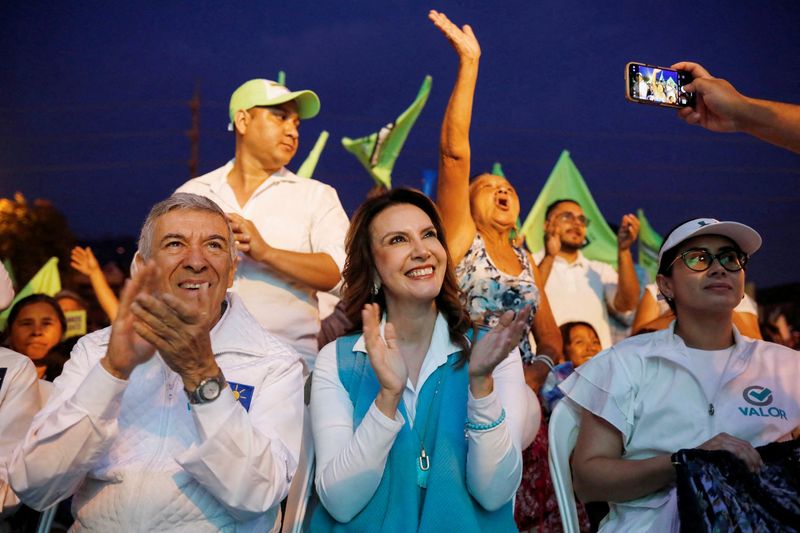Fed up with graft, Guatemalans face familiar names in presidential vote
2023.06.19 08:52
5/5

© Reuters. FILE PHOTO: Guatemalan presidential candidate Zury Rios and vice presidential candidate Hector Cifuentes for the coalition of political parties Valor and Unionista, attend an event of Rios’ campaign rally, in Guatemala City, Guatemala April 16, 2023. REUT
2/5
By Sofia Menchu and Diego Oré
GUATEMALA CITY (Reuters) – Guatemala holds a presidential election on Sunday with voters clamoring for a government that can tackle corruption, inflation and violence, though no candidate is expected to secure enough votes to win outright, setting the scene for a run-off.
Polling points to a close contest between former first lady Sandra Torres, conservative career diplomat Edmond Mulet and right-winger Zury Rios, daughter of the late dictator Efrain Rios Montt, after one of the favorites was barred from the race.
Polls present no clear frontrunner at this stage.
The leading candidates from a field of more than 20 hopefuls have all mounted multiple attempts for the presidency in a country where frustration is growing over failure to tackle corruption that has strained relations with the United States.
None are forecast to come even close to clinching the 50% plus one vote needed to win outright, meaning the two leading contenders will likely go to a second round run-off on Aug. 20.
Risa Grais-Targow, an analyst at the Eurasia Group, said Torres, candidate of the center-left National Unity of Hope (UNE), would likely make the second round, but could then struggle because she polarizes public opinion.
“One of the three main conservative candidates … would likely defeat Torres given her high rejection rates,” she said.
Conservative businessman Carlos Pineda was a surprise leader in the polls until a tribunal last month ruled him ineligible for failing to comply with electoral rules. Pineda appealed the decision but his complaint was thrown out by the country’s highest court.
Corruption scandals have buffeted the administration of the outgoing president, 67-year-old conservative Alejandro Giammattei, who won office four years ago vowing to clean up government. Under Guatemalan law he cannot seek re-election.
“Giammattei has definitely governed badly if you look at all the corruption cases, and his management during the pandemic,” said Pilar Garcia, a 24-year-old student in Guatemala City.
Garcia said the next president also needed to deliver results on education, health, unemployment, and violence.
Over the past decade, Guatemala has fallen to its lowest ebb in the corruption perception ranking of watchdog Transparency International, slumping to 150th out of 180 countries.
CONCERN
Giammattei did nothing to revive a U.N. backed anti-corruption watchdog controversially terminated by his predecessor, and he repeatedly clashed with the U.S. over efforts to curb graft and his management of the justice system.
“We’re very concerned because the situation right now leads us to think the next possible president of Guatemala won’t be committed to the fight against corruption, to human rights, or restoring democratic values,” said Carolina Jimenez, head of the Washington Office on Latin America (WOLA), a think tank.
During the COVID-19 pandemic, Guatemala recorded the highest number of deaths per capita in Central America.
Murder rates have fallen steadily over the past decade, hitting a low of 15.2 per 100,000 people in 2020. However, for the past two years the rate has begun climbing again.
Many of Guatemala’s 17 million population feel jaded about the institutions, and some government critics bridled on Wednesday when a court sentenced a prominent critical journalist to six years in prison for money laundering.
Jose Zamora, 66, had described the case against him as a witch-hunt by Giammattei due to his reporting on alleged corruption involving the president and close allies in newspaper elPeriodico, which shut down in May. Giammattei denies this.
Whoever wins, the government is likely to continue with macroeconomic prudence, and keep resisting calls for transparency, said Grais-Targow at Eurasia Group.
They will have to tackle inflation, which tripled between 2021 and 2022 to more than 9.2%. Meanwhile, more than half the country remains in poverty, fueling emigration to the U.S.
That, in turn, has ramped up remittances from the U.S., which over the past decade have quadrupled to $18 billion, outstripping exports and far higher per capita than in Mexico.
The United States remains by far Guatemala’s biggest trade partner, which analysts say may have helped to preserve the country’s diplomatic ties with U.S. ally Taiwan, even as more and more of Central America switches allegiance to Beijing.
In addition to the president and vice president, Guatemalans will vote for a new Congress, mayors and members of the Central American Parliament (Parlacen).








